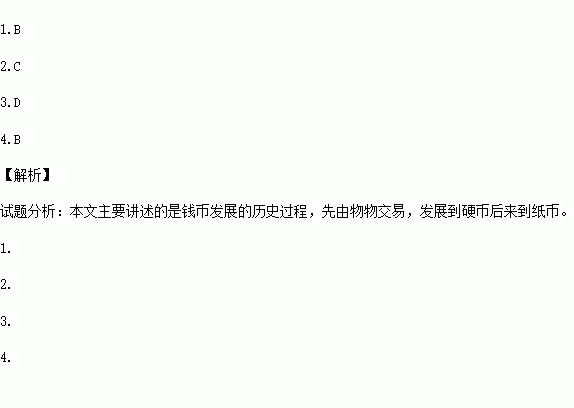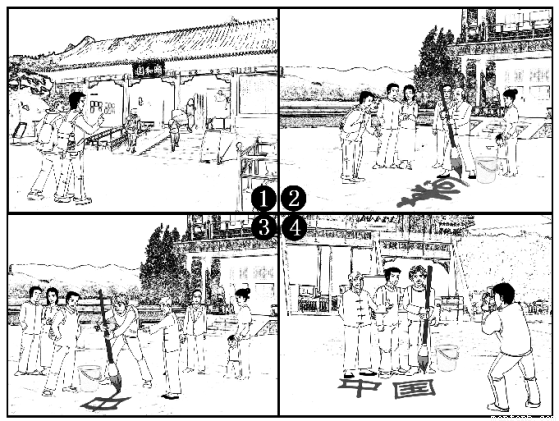题目内容
阅读下列短文,从每题所给的四个选项(A、B、C和D)中,选出最佳选项。
We all use money every day. It is essential because we can pay money for whatever we want.Money is recognized as banknotes and coins.
However,many years ago people couldn’ t go to the shop and buy what they wanted.They had to get what they wanted through the barter trade(实物交易).It was really difficult,for the barter often depended on coincidence of wants.For example,the seller of grain has to find a buyer who wants to buy grain and who also could offer something the seller wants to buy.And one more example,if a wheat farmer needs what a fruit farmer produces,a direct exchange is impossible because seasonal fruit would spoil before the grain harvest.The solution is to trade fruit for wheat indirectly through a third intermediate commodity(中间的商品),such as cattle,salt,shells,wine.However,commodity money had their disadvantages.For example,cattle,fur,precious stones couldn’ t be cut into smaller pieces and it was inconvenient to keep and transport them.Thus coins were invented.
The earliest known coins in the western world came from Lydia in about 650 B.C.Greek cities,the Great Persian Empire and Roman Empire quickly adopted the new useful technique of metal currency.And by the end of the 6th century,coinages were common throughout the region.However,coins as well as commodity money had many disadvantages.For instance,coins quickly show wear(磨损) and they usually have small value,so it’ s difficult to count large sums of coins.
At first,paper money was used in China in about 650 A.D.After then,it was used in Persia and Japan.In Europe,paper money was firstly produced in the Netherlands in the 16th century and in the USA in the 17th century.Paper money is worthless but symbolic.In other words,paper money is just a note.It has a purchasing power because the government announces it as money and citizens accept it universally.
1.The writer explains the difficulty of barter trade by_______.
A. telling stories B. using examples
C. presenting a theory D. making a comparison
2.What do we know about the early coins?
A. They usually had large value.
B. They were first used in Greece.
C. They still had many disadvantages.
D. People didn’ t like the metal currency.
3.Paper money was used earlier in_______.
A. Rome B. Greece
C. the USA D. the Netherlands
4.What is the passage mainly about?
A. Function of money. B. History of money.
C. Invention of money. D. Types of money.
 天天向上一本好卷系列答案
天天向上一本好卷系列答案 小学生10分钟应用题系列答案
小学生10分钟应用题系列答案

 ),并在其下面写出该加的词。
),并在其下面写出该加的词。